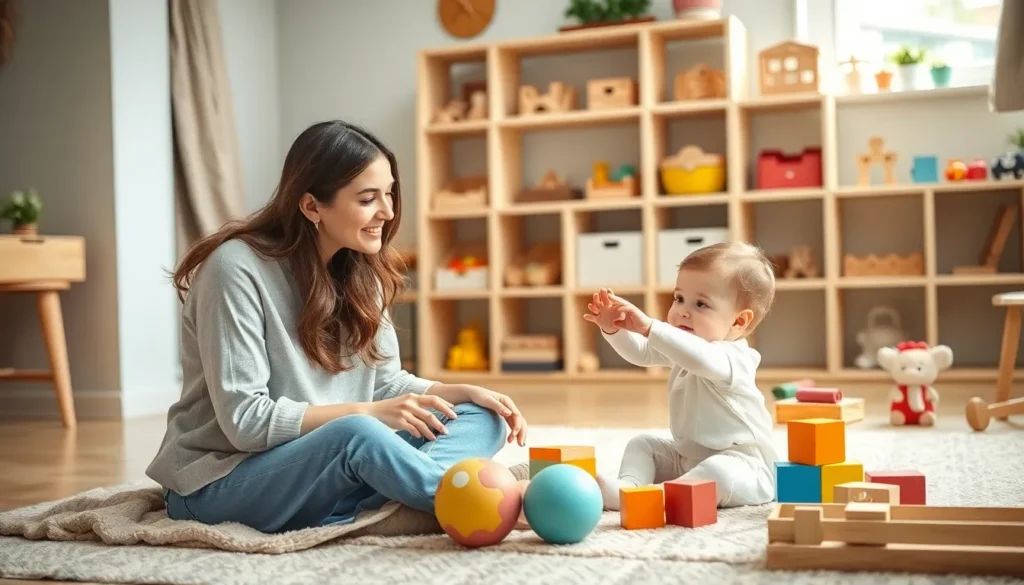Table of Contents
ToggleIn the world of early childhood education, Montessori infant materials are the secret sauce that turns tiny tots into little geniuses. Designed to engage curious minds, these materials transform the mundane into the magical. Imagine a world where infants explore, learn, and grow through hands-on experiences—sounds like a dream, right? Well, it’s not just a dream; it’s Montessori!
These innovative tools are crafted to cater to the natural instincts of infants, allowing them to discover the world at their own pace. From colorful sensory toys to practical life activities, Montessori materials make learning feel like playtime. So, if you’re ready to dive into a treasure trove of educational wonders that’ll keep your baby entertained and developing, buckle up! The journey into the enchanting realm of Montessori is about to begin.
Overview of Montessori Infant Materials
Montessori infant materials play a crucial role in early development. These tools encourage exploration and support infants’ innate curiosity through engaging, hands-on activities.
Importance of Sensory Experience
Sensory experience forms the foundation of learning in infants. Montessori materials often emphasize tactile elements, promoting touch through various textures and shapes. Hearing is also involved, as rattles and sound blocks introduce auditory stimulation. Infants interact with these materials, enhancing their sensory perception and awareness of the environment. Engaging multiple senses simultaneously fosters neural connections, which are vital for cognitive development. When infants engage with sensory-rich tools, they strengthen their understanding of the world around them.
Developmental Benefits
Developmental benefits of Montessori infant materials are extensive. These tools cater to essential growth areas, including fine motor skills, sensory exploration, and cognitive development. By encouraging grasping and manipulation, materials enhance dexterity and hand-eye coordination. Infants develop problem-solving skills through trial and error as they explore how to use each item effectively. Social skills also improve when infants interact with caregivers and peers during play. Overall, the thoughtfully designed materials contribute significantly to holistic development during infancy, promoting essential skills that benefit children long-term.
Types of Montessori Infant Materials

Montessori infant materials encompass various categories that stimulate growth and development. Each type serves a specific purpose, addressing different aspects of a child’s learning journey.
Practical Life Materials
Practical life materials focus on daily life activities, fostering independence in infants. These tools include objects for pouring, spooning, and sorting. Engaging with these materials encourages fine motor skills and hand-eye coordination. Infants learn to care for their environment, which builds self-esteem. Through repetition, children gain confidence in their abilities as they master various tasks.
Sensory Play Materials
Sensory play materials provide diverse textures, sounds, and visual stimuli. Examples include textured balls, fabric swatches, and sensory bins filled with safe objects. Engaging with these materials enhances sensory perception, crucial for cognitive development. Infants discover the world through touch and sound, which supports neurological growth. Interaction with sensory materials invites exploration, fostering curiosity.
Language Development Materials
Language development materials assist in enriching vocabulary and communication skills. Items such as picture cards, books, and sound boxes encourage verbal interaction. These tools promote auditory recognition and language comprehension. Infants exposed to these materials develop a strong foundation for future language skills. Early interaction with caregivers through these resources nurtures a love for communication.
How to Choose Montessori Infant Materials
Selecting suitable Montessori infant materials requires careful consideration of various factors to support a child’s growth effectively.
Age Appropriateness
Choosing age-appropriate materials ensures optimal engagement and development. Materials designed for infants, such as soft blocks or grasping toys, stimulate exploration and sensory awareness. Each item should align with the developmental milestones typical for infants, focusing on tactile and auditory experiences. Look for materials that encourage independent play while matching an infant’s physical and cognitive skills. Providing age-appropriate materials fosters confidence and promotes learning at a natural pace.
Quality and Safety Considerations
Prioritizing quality and safety is crucial in selecting Montessori materials. Opt for products made from non-toxic, durable materials that can withstand infant exploration. Each item should feature smooth edges to prevent injuries. Ensuring that all materials comply with safety standards helps create a secure learning environment. Regularly inspect the materials for wear and tear, replacing damaged items promptly. Making safety a priority supports a worry-free play experience that facilitates healthy development.
Implementing Montessori Infant Materials at Home
Creating a nurturing Montessori environment enhances infants’ natural learning. Use soft lighting and calming colors to invite exploration. Arrange materials at eye level, allowing easy access for the child. Prioritize open spaces for movement, fostering freedom and curiosity. Include a variety of carefully selected materials that provoke different senses.
Incorporating materials into daily routines promotes engagement and learning. During mealtime, allow infants to practice pouring with child-friendly cups. Incorporate sorting activities using colorful items during playtime. Reading together with books featuring vibrant images can enrich vocabulary. Provide opportunities for sensory activities, such as playing with texture-rich toys during quiet moments. Consistency in routines encourages infants to engage with materials, supporting their developmental milestones.
Montessori infant materials play a crucial role in nurturing a child’s natural curiosity and development. By offering engaging and sensory-rich experiences, these tools empower infants to explore their surroundings independently. The benefits extend beyond immediate learning; they foster essential skills that support cognitive and social growth.
Creating an enriching environment at home with these materials can significantly enhance an infant’s learning journey. When thoughtfully selected and integrated into daily routines, they encourage exploration and creativity. Parents and caregivers can unlock the full potential of their little ones by embracing the Montessori approach.





